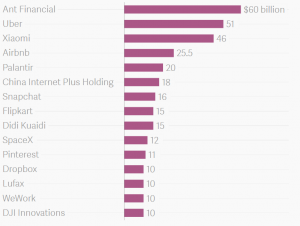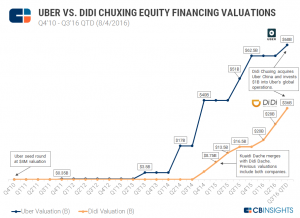Through the semester we have come to realize that China can no longer sustain on low skilled jobs. The economy needs to begin to move into a more complex industry in order to continue growing maintain a competitive edge. While we may not see headlines in the United States yet, private companies in China may have already begun taking huge stakes in the internet.
Uber has long been the largest private internet company but man y Chinese companies aim to take Uber’s place. Back in April 2016, people were valuing Ant Financial at around $60 Billion dollars, a Chinese financial assistance company, beating Uber by $9 billion dollars. Today, while Ant financial no longer has the same valuation as before, two Chinese companies follow Uber: didi chuxing (滴滴出行) at #33.8 billion and Xiaomi (小米科技) at $46 billion.
y Chinese companies aim to take Uber’s place. Back in April 2016, people were valuing Ant Financial at around $60 Billion dollars, a Chinese financial assistance company, beating Uber by $9 billion dollars. Today, while Ant financial no longer has the same valuation as before, two Chinese companies follow Uber: didi chuxing (滴滴出行) at #33.8 billion and Xiaomi (小米科技) at $46 billion.
Didi Chuxing is a ride-sharing company exactly like Uber. Besides being created in China and User-Interface differences, the two apps operate the same way and yet Uber lost almost a billion dollars in 2015 trying to compete with Didi Chuxing. Last year, after a long hard battle, Uber decided to be bought by Didi Chuxing particularly due to losses totaling to almost a billion dollars again. With such an acquisition, Didi Chuxing now looks to expand into the global market and perhaps one day overtake Uber in valuation.
trying to compete with Didi Chuxing. Last year, after a long hard battle, Uber decided to be bought by Didi Chuxing particularly due to losses totaling to almost a billion dollars again. With such an acquisition, Didi Chuxing now looks to expand into the global market and perhaps one day overtake Uber in valuation.
Xiaomi is the fourth largest phone manufacturing company behind Huawei, Samsung and Apple. Like Huawei, people do not recognize the brand Xiaomi very often in the United States but have constantly released their own line of processors and smartphones. Xiaomi’s low-budget smartphones may have limited their global launch but they have begun starting in India. At an event in Dubai, they showed three new models ready for launch in India and North Africa.
So we must keep a close eye on these industries as they slowly begin entering the global market. Both Xiaomi and Didi Chuxing have yet to fully enter and achieve a worldwide presence thus it will be interesting to see how they plan to enter their respective saturated markets in the United states. Didi Chuxing could face the same fate as Uber if they expand to the States and Xiaomi may simply never make a dent in the smartphone market.
Sources:
https://www.cbinsights.com/research-unicorn-companies
https://qz.com/670303/alibabas-spinoff-financial-service-company-is-now-worth-as-much-as-uber/
https://www.wsj.com/articles/china-s-didi-chuxing-to-acquire-rival-uber-s-chinese-operations-1470024403
http://www.globaltimes.cn/content/1034391.shtml
I think the rise of Didi is an interesting tie back to Hessler’s text. With the rise of the Chinese auto industry, there will be more private cars on the road to support the ride sharing app. I do not, however, see the same type of growth opportunity for a smartphone manufacturer, as the existing market is well dominated by major global players and Chinese manufacturers would have to spend a fortune in marketing and other developments in order to convince global consumers to switch smartphone brands.
Apple is #4 in China? #5? Don’t blithely assume the names we know are the real players in places such as China, India and Africa. Japan, Europe and the US are all about replacement demand. China is moving in that direction. India and Africa are all new sales. See Matthew’s comment below.
I would argue that the market for a true budget priced smartphone is very large and mostly untapped; especially in Asia. It may be that our market in the States is dominated by a couple of major players, but those Phones are expensive. Asia has more of a demand for cheaper phones that have utility but don’t carry a brand name recognition.
I’ve heard before about the Chinese government engaging in some pretty dubious practices, including aggressive taxation policy and protection from international intellectual property laws, to allow these Chinese firms using almost the exact same model as Western firms to flourish. In the short term, the benefits are easy to see: technology as a sector is still exploding and China is trying to leverage this into economic growth and a position at the forefront of global technology markets. However, I wonder whether China will be able to sustain growth in new, high value added industries if its entrepreneurial model continues to hinge on copying Western business plans.
Chinese cell phones use open source components and open source software (Android), and then add their own customization. Even when they mimic designs, it’s often with logos that make it clear they’re not “the real thing,” whatever that might be. The market is no longer one where consumers are satisfied with poor quality knock-offs. Cheap toys, logo goods and cell phones live in a different universes.
You can also find studies of electronics assemblers in Shenzhen and Dongguan. They have key card security between floors, the whole 9 yards because if details of what they’re working on gets out (the iPhone 8, for instance) they’re out of business.
The issue of barriers to entry comes to mind. It seems that both Didi and Xiaomi have made strong claims on the Chinese market, while Uber and Apple (as proxies for companies that have already entered the global market) have focused elsewhere. Will it be easy for these companies to leave China and enter a market which is already dominated by other groups?
I think its highly unlikely that Xiaomi will be able to compete with the Android and iPhone market in the U.S. currently. Especially with current political attitudes towards foreign firms. Like Will said above, I think one of the only reason’s Chinese technology firms have been able to occupy the same market niche so well in China as more developed companies such as Apple have is due to dodgy policies towards intellectual property.Thats not to say, however, that China will not be able to compete on the international market in other areas, especially areas where they more developed companies may not focus a lot of their attention such as Niger.
Xiaomi is Android – who would buy a smart phone for which no apps are available? Globally most cell phones are Android. Apple iOS has the high end, a vulnerable position with a declining market share. No one uses the Microsoft system. Or Blackberry. Flip phones do however still get sold in large numbers.
It seems that the common theme in tech as well as in China is that not only does first to market succeed, but companies that truly understand the market end up winning. We saw this with Amazon vs Alibaba and now again with Uber vs Didi. One of Uber’s main flaw is their issue in scaling to the point of becoming profitable. One main reason why Uber has yet to go public is their inability to turn a profit; they are using private raising private equity money to offset losses with the hope that when achieving a critical mass of drivers and users world wide, their price will lower to the point of constant profits. It is interesting that these Chinese ride sharing apps are so quickly able to achieve this.
See my blog for my take on Uber: it has no strategic options that will ever let it earn a profit. But it has raised enough cash that it won’t fail quickly. Discussions of Uber come up frequently in Econ 243.
I don’t know if Didi is in the same position, they have the potential of expanding into markets underserved by the existing sharing services we generally know as metered taxi cabs. They certainly can’t rely upon existing upper-middle-class car owners to be using their vehicles to give strangers rides, that part of the Uber model doesn’t transfer to countries where ordinary people don’t own cars. My guess is that they are much closer to a taxi fleet operator than is Uber, but in a world where people have smart phones now but may never have a car so that standing on a corner and waving your arms has never been part of the experience of potential riders.
I think Chinese brands will have a hard time breaking into American markets in the near future in terms of luxury physical goods, ie beyond what you will find at walmart. Though an Apple computer is largely made in China, that American name and American company, gives it some degree of separation from a bad knockoff pair of sunglasses. It’s really a marketing issue. However, internet based companies like those you mentioned above stand a real chance. There is no branding issue or stigma surrounding their origin. No politician is going to lament the lack of manufacturing jobs and the dried up towns scattered throughout rural America because urban professionals are hailing a chuxing ride to work instead of an uber. I think there is a real potential here that does not exist with more traditional goods.
I’m interested to see how Uber’s valuation in China is affected by the video that surfaced recently documenting a heated exchange between an Uber driver and Uber CEO Travis Kalanick regarding driver rates. This obviously impacts U.S. perception of Uber, given that wages are far more regulated in the U.S. as it pertains to skilled labor. However, in China, where hundreds of millions of workers still struggle to make a living wage in a far less controlled environment, its possible that perception might now change much and that its market share might just stay the course.
I think Did Kuadi and Xiaomi are really strong in China for 2 main reasons: 1 is that both the CEOs really understand the Chinese people, which is a very crucial aspect in itself. 2, they all have some support with the Government, and as everyone knows, the government is all powerful in China. Chinese companies tend to do very well in China because the conditions favor them, most of them do not even attempt to break into foreign markets. Until their product improves on a world class scale, then maybe that will change.
While the businesses you have mentioned have proven to be wildly successful, I think it will be extremely hard for them to integrate outside of China. The astronomic growth they have realized is due largely in part to China’s population of ~1.4 billion. In such a large country, new technology is bound to take off more rapidly than in small countries.
China’s technology sector has grown a tremendous amount in the last decade, but it will be interesting to see how companies in this industry attempt to take on western competitors. As we’ve talked about in class, labor costs in China are rising, which is incentivizing producers to move to other lower cost countries. Although labor costs are rising, do you think China will be able to keep these large technology companies within their borders?